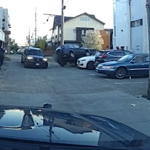
A new seven-member police squad is patrolling the downtown core to tackle persistent, low-level crime that can make streets and parks feel unsafe.
The Neighborhood Response Team, created in December, is focusing on so-called “street disorder” crimes, such as shoplifting, public urination, defecation and drug use. Downtown businesses and community groups have increasingly raised concerns about the problem and pushed for the city to take action.
The officers are helping connect people to social services, as well as giving warnings and issuing citations to repeat offenders.
While the new emphasis should make a difference, it would be a mistake to think seven police officers can eliminate street disorder, West Precinct Capt. Chris Fowler said.
“This is a very complex problem throughout the city,” he said. “This squad is really charged to affect the most critical areas downtown. They aren’t going to solve it throughout the city. They aren’t going to solve it throughout the West precinct. But they might be able to help in some of the worst areas.”
The squad, comprised of six officers and a sergeant, began foot patrols the first week of December. It operates out of the West Precinct office, at 810 Virginia Street, and concentrates on persistent problem areas, including around Westlake and other downtown parks. The officers generally work from 6:30 in the morning, until 3:30 in the afternoon.
They have one job — reducing street disorder, Fowler said. “They will not be called away to routine 911 calls,” he said. “This is their assignment and unless there is a true emergency, they are not going to be pulled away from their core responsibilities.”
The officers will become experts on the complex web of rules and regulations covering street disorder.
The city, for example has an ordinance that says people can’t sit or lie on sidewalks from 7 a.m. to 9 p.m. in an area that stretches from Denny Way to King Street and from Interstate 5 to the water.
However, it is legal for people to sit and lie in city parks and, in some cases along the waterfront, park boundaries include the sidewalks. So officers have to understand where they can and can’t enforce the ordinance.
Enforcing laws surrounding smoking marijuana, or drinking in public, also can differ depending on where the offense is taking place.
In the end, though, it’s not just about writing tickets.
Lisa Daugaard, policy director for the Public Defender Association, hopes the squad will spend much of its time connecting people with drug addiction and mental health issues to services that can help them, such as the Crisis Solution Center and the Law Enforcement Assisted Diversion, LEAD, program.
The LEAD program, for example, gives officers the ability to connect low-level non-violent drug dealers and users with treatment and services as an alternative to taking them to jail.
That’s a much better approach than just directing people to shelters, Daugaard said, noting “People know where the shelters are.”
SPD officials say the squad has a large toolbox to work with, including connecting people with programs like LEAD. Ultimately, the success or failure of the squad won’t be based on how many citations they write. “it’s going to be on how the behavior has changed,” said Virginia Gleason, the police chief’s lead strategic advisor.
In many cases, just having officers patrolling problem areas can make a difference.
“One of the things we see at Occidental and Westlake parks is there are groups of people who specifically go there because they know those are places to buy and sell drugs,” Gleason said. “If a police officer is there, they are not going to engage in criminal behavior.”


